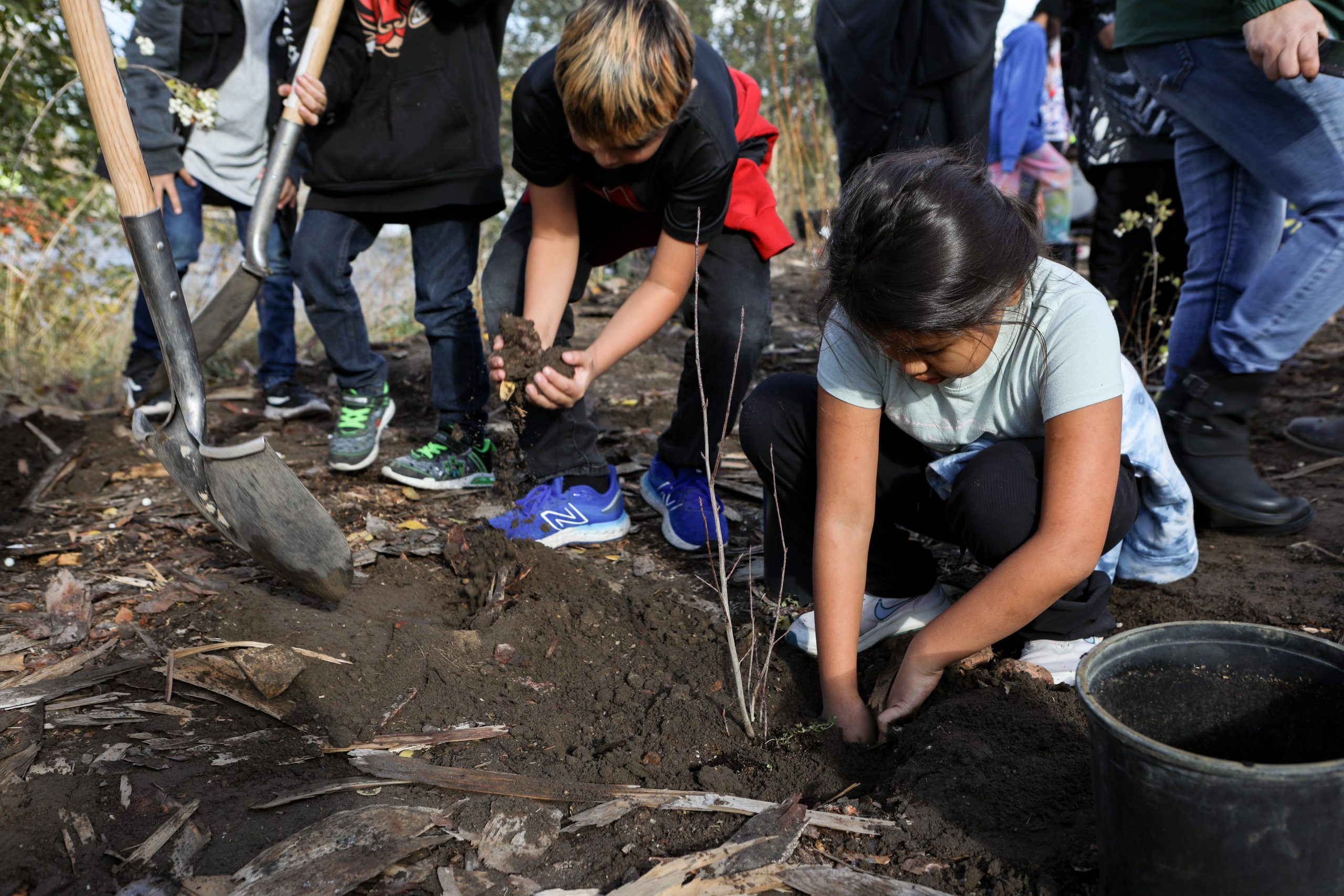Nuchatlaht land title case tests province’s UNDRIP promise, but reveals ‘hypocrisy’
Rooted in legal cases before it, the title case over part of Nootka Island is a fight for recognition and self-determination

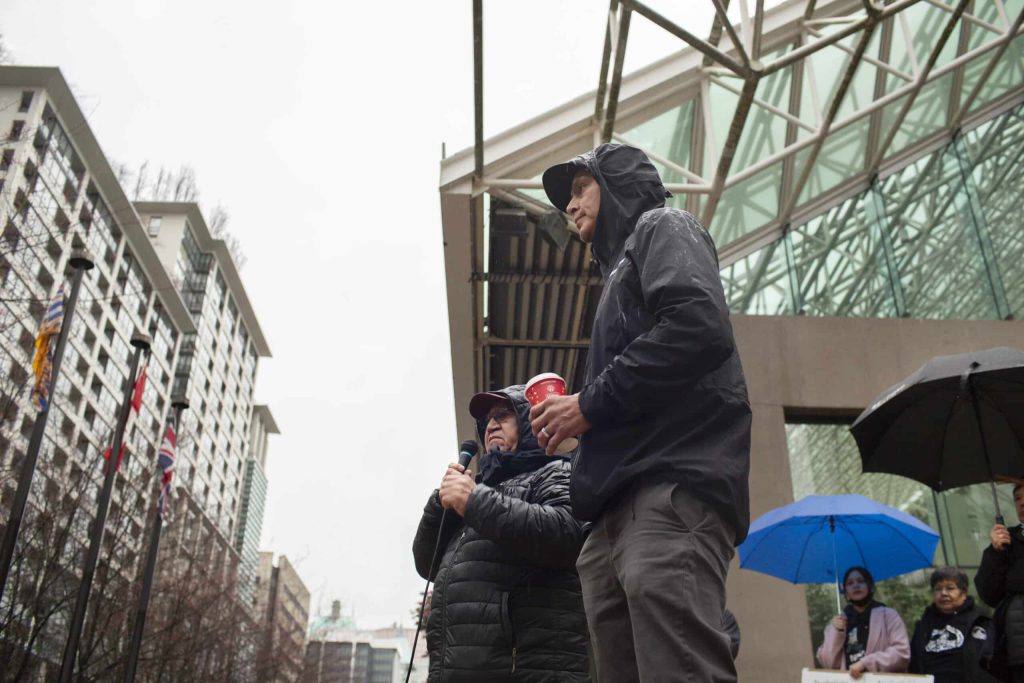
In March, Nuchatlaht House Speaker Archie Little stood outside of a “Vancouver” courthouse in the rain, vowing that his community would regain rightful title to their unceded homelands.
“We are going to make changes that benefit everybody,” he said to media and supporters. “And we’re going to start respecting Mother Earth. It’s not going to be about money … just to benefit a few. We work towards everybody benefiting.”
That was the start of the trial launched by Nuchatlaht First Nation, which is taking British Columbia to court claiming rights and title over their territory. They’re hoping to regain control of about 200-square-kilometres of the 510-square-kilometre Nootka Island, situated off the west coast of “Vancouver Island.”
Little grew up in his homelands and regards the territory as “one of the most beautiful places in the world,” surrounded by crystal waters and once-lush with towering forests. The territory was never given up by Nuchatlaht, but colonization has forced people away from their homelands and ravaged their territory — particularly decades of clearcut logging.
“I think our trees are our strength, they give structure to our land” said Nuchatlaht’s Cathy Michael in a video posted by the nation. “We’ve got so many washouts now, mudslides and everything, because we don’t have the trees there to protect it.”
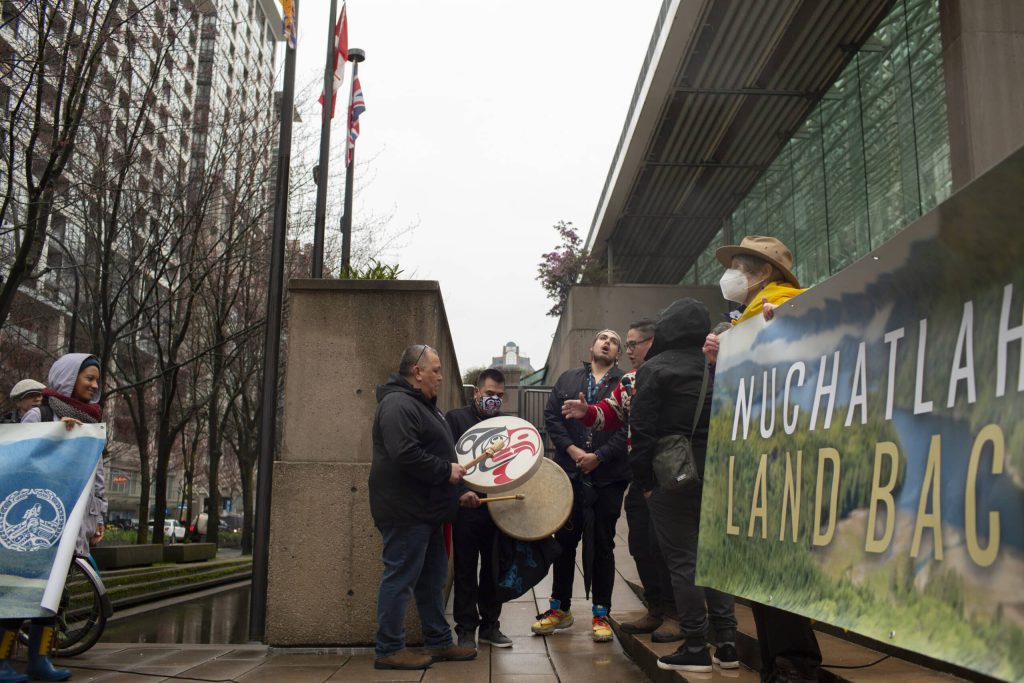
Building on Tŝilhqot’in
It took lawyers forty days to present evidence to Justice Elliot Myers in B.C. Supreme Court between March and May of this year. Defence lawyer Owen Stewart is working with Jack Woodward and his team representing Nuchatlaht First Nation.
The trial is now on break, but closing arguments are set to begin on September 26 and conclude by October 14. A decision is expected to follow in the new year.
“Ninety percent of the trial is over,” said Stewart, “but the trains aren’t in the station yet.”
Nuchatlaht hopes to build on the landmark ruling on Aboriginal title in “Canada’s” Supreme Court — Tŝilhqot’in v. British Columbia in 2014. Woodward was responsible for Tŝilhqot’in’s historic win, and — now that the precedent has been set — his team is gunning for another.
British Columbia’s key defense argued that the Nuchatlaht Nation “were too small and weak” to claim Aboriginal title, insisting instead that they abandoned their territory.
“The evidence is the opposite,” said Woodward during a public court case update via Zoom, hosted by the Wilderness Committee.
He said the Nuchatlaht were forced from their territories through the creation of the reserve system; the imposition of the Forestry Act, which made it illegal to harvest timber and build dwellings; and the imposition of the Parks Act, which made it illegal to cut flowers and harvest berries.
Access to their territories was then impeded by Western Forest Products, which holds a provincially recognized forestry tenure over the “Crown” land. The claim relies upon evidence from 1846, when the British Crown asserted sovereignty over Nootka Island, resulting in the present-day colonial border between so-called “Canada” and the “United States.”
During the same Zoom update, Little reminded listeners that mandatory attendance at residential “school” also meant that for ten months of the year, the children were gone.
“Then the wealth of our Tyees became so low we had to go make a living somewhere else because of licences and quotas and so on,” he shared.
While experiencing the devastating effects of colonization, generations of Nuchatlaht muschim (people) have maintained their hereditary government — with their Ha’wiih (chiefs) always defending their territory and refusing to surrender title, according to the nation.
Nuchatlaht people maintained their territory until “B.C.” and “Canada” implemented “wasteful industrial systems” that benefited corporations but not the Nuchatlaht. Launching this case is the result of failed consultations with colonial governments, the Nation stated when the claim was first filed in 2017.
“When the first European explorers arrived in Nuchatlaht territory, they observed and recognized Nuchatlaht ownership and governance and paid tribute to their Ha’wiih,” said an earlier statement. “Until the arrival of these early foreign visitors and the interference of modern governments, Nuchatlaht Ha’wiih intensely managed and protected all land and aquatic resources within their Hahoulthi (chief’s exclusive territory).”
Nuchatlaht Tyee Ha’wiih Jordan Michael hopes that winning the title case will help the Nuchatlaht people step away from colonial-induced poverty and move back to their homelands.
“It’s going to solve a lot of our housing problems and our social issues,” he said. “That’s what really excites me.”
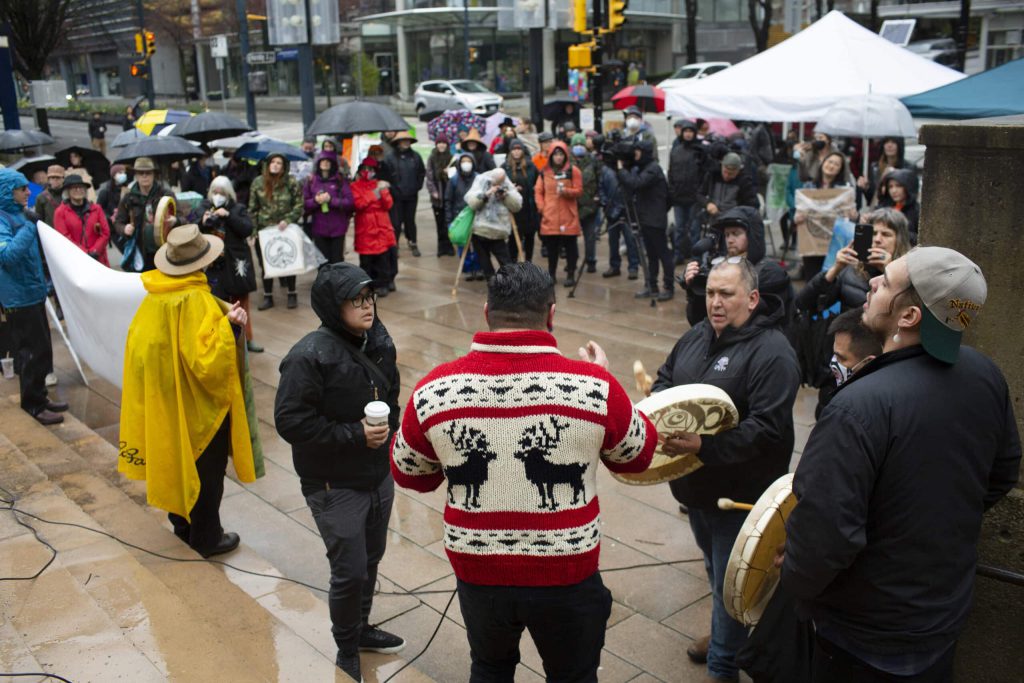
Testing DRIPSA
The Nuchatlaht case will be the first to test B.C.’s Declaration on the Rights of Indigenous Peoples Act (DRIPSA), which was passed into law in November 2019.
The declaration is supposed to establish the province’s framework for reconciliation, and includes key areas of legislation, including ‘“Section Three,” which mandates the government to bring provincial laws into alignment with the United Nations Declaration on the Rights of Indigenous Peoples (UNDRIP).
On April 21, the province, in response to Section Three, released the new “Directives on Civil Litigation involving Indigenous Peoples,” which require provincial legal counsel to take positions consistent with UNDRIP.
“It seems like the province’s approach to litigation with First Nations people hasn’t changed much for forty years,” said Stewart. “You can see that in some of the ways the Crown has responded [through evidence] in a manner that reflects very closely the Delgamuukw trial of forty years ago.”
In the 1997 Delgamuukw decision, the definition, content and extent of Aboriginal title was litigated, with the conclusion that Aboriginal title did not exist, and that any title the Gitxsan and Wet’suwet’en Nations may have had was extinguished when “British Columbia” joined the Confederation.
“The province is making similar defences without much basis,” said Stewart. “So the fact that the province has announced a new directive is a good thing, and the content of the directive is quite good, too.”
One directive states the province “will also only plead defences of surrender or abandonment in exceptional circumstances and only where there is a principled basis and compelling evidence to support the defence.”
While the defence of abandonment was dropped by the province in early April, they still claim Nuchatlaht have “no substantial connection” to their territory. Stewart believes the two concepts are “clearly linked,” adding that the province’s original pleading had them both listed in the same paragraph.
When the directives were first published on April 21 — midway through the Nuchatlaht trial — an excited Woodward placed a physical copy of the directives in front of the judge, he said, and suggested the province’s lawyers needed some time to make changes to their pleadings because at present, they did not meet the directives new UNDRIP-aligned standards.
According to Woodward, provincial lawyers responded with no additional changes, posing the question as to why “B.C.” passed DRIPSA into law, if it doesn’t intend to follow through on its own legislation.
“The response was heartbreaking and disappointing,” said Woodward.
“There has been no show of good faith,” added Michael. “The hypocrisy of the provincial government is very apparent, and needs to be addressed.”
Nuchatlaht Councillor Melissa Jack said the government “can’t pick and choose” when DRIPSA is applicable.
“This is a stall tactic from the Crown’s lawyers and is disrespectful to all parties involved,” she said. “The attorney general should be questioned about his government’s conduct in the Nuchatlaht case and should not disregard the rights of Indigenous Peoples, including the current one at hand, the Nuchatlaht people.”
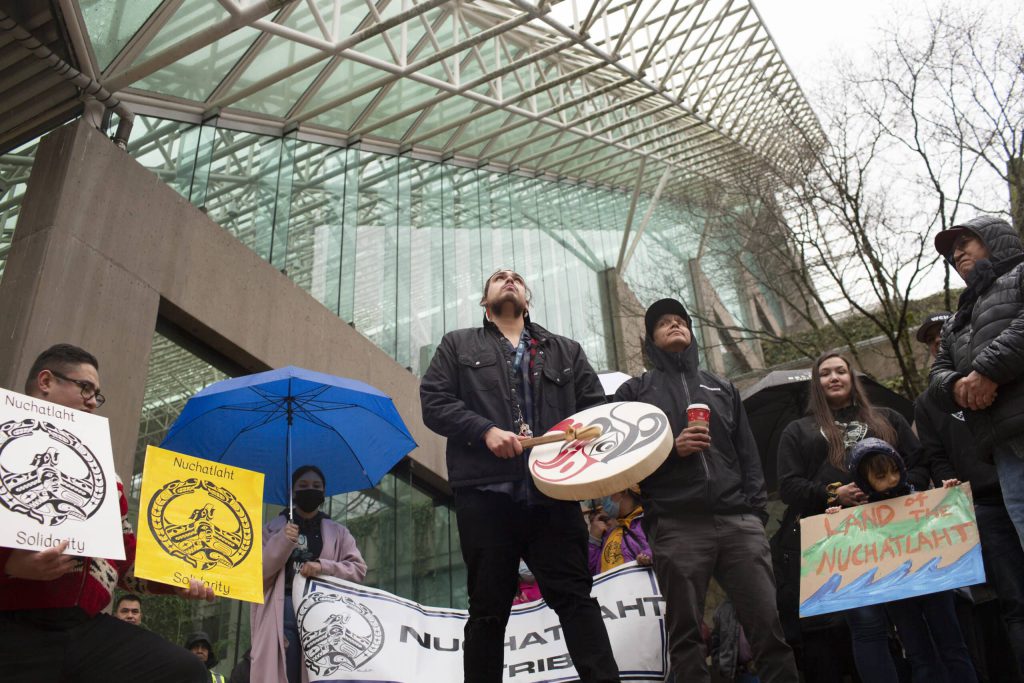
Forestry agreements as evidence
Nuchatlaht is one of 186 First Nations in “B.C.” that have entered into Forest Consultation and Revenue Sharing Agreements (FCRSA) with the province. The agreement is part of the province’s legal obligation to consult with First Nations whenever they want to carry out land-altering activities such as resource extraction on their territory that may impact on Indigenous rights.
According to Stewart, once an FCRSA has been signed, what could once have been counted as a “high” impact on Indigenous rights — as determined by the province — automatically reduces to a “medium” or “low” impact on Indigenous rights. This settler-constructed decision determines what level of consultation the province engages a First Nations in, with regards to decision-making over its own unceded territory.
The agreement is supposed to be a “good faith, government to government contract” between a First Nation government and the provincial government, said Stewart. Yet, the province has submitted Nuchatlaht Nation’s FCRSA as evidence to support the notion that the Nuchatlaht “abandoned” their land.
“[FCRSAs] include something called a ‘without prejudice’ clause,” he added. “These clauses can be worded in different ways, but effectively they mean you can’t use this agreement in court.”
Instead, the province submitted Nuchatlaht’s FCRSA as evidence; using it as a tool to prove its case that the Nuchatlaht do not hold Aboriginal title over their territory — that they abandoned their land because they are “small and weak.”
Another forestry contract negotiated between a First Nation and the province is the Forestry Tenure Opportunity Agreement (FTOA). Whereas an FCRSA determines the framework for consultation to take place between a First Nation and the province, forest tenures are the mechanism by which the government grants forestry licences or permits to First Nations.
Similarly to an FCRSA agreement, forest tenures are made in good faith between governments. The agreements include multiple without prejudice clauses, and in a growing number of cases, includes explicit language on “reconciliation.”
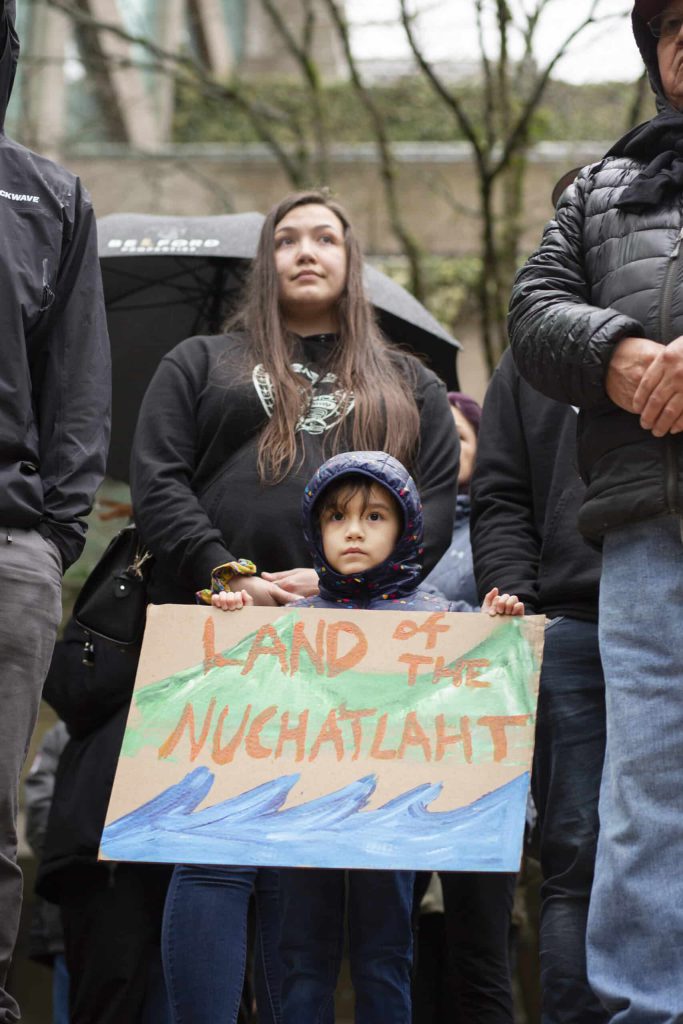
A political buzzword
In a provincial document about First Nations forest tenures, the “B.C.” government states that FTOAs acknowledge that the award of tenure “supports the reconciliation of Aboriginal rights and title and assists to help First Nations meet the goals and objectives of the Transformative Change Accord.”
Stewart believes the term “reconciliation” has become a political buzzword.
“The province ends up tacking the word on because it looks good politically,” he said. “But it’s hardly reconciliatory when the province ends up weaponizing these agreements by using them in court.”
Nuchatlaht Councillor Erick Michael said he doesn’t see how “reconciliation” can happen with “B.C.” failing to follow litigation directives around upholding Indigineous rights.
“B.C. has shown us in the past how we cannot trust them,” he said. “By continuing to go against their own words, it just proves that there is no reconciliation in sight.”
As well as submitting Nuchatlaht’s FCRSA as evidence of abandonment, the province has also submitted Nuchatlaht’s FTOA, signed between the province and Nuchatlaht in 2005.
“This is problematic because … almost every First Nation in the province has signed onto one of these,” said Stewart. “I think they would like to know before they sign that the province is going to try and use them in court.”
Stewart said that by using these documents, the province is effectively breaking their agreements, “or at least trying to.”
Woodward and his team don’t yet know the extent to which the province will attempt to use the forestry agreements in court, as they’re yet to hear the final arguments. They’re concerned that by entering them in evidence the province is weaponizing good faith agreements signed by First Nations as part of the process of reconciliation.
“Use of these agreements in litigation is not in keeping with the goals of reconciliation,” said Stewart.
Stewart believes that many First Nations underestimate the legal powers they have. Of the many FCRSA and FTOA agreements he’s seen, he doesn’t believe many have been negotiated. “They look like templates to me,” he said.
The forestry agreements were “a questionable deal” to begin with, he added. “It’s pennies on the dollar for the sort of harm that some of these agreements can cause,” he said, referring to the automatic drop in the level of consultation required after a First Nation signs an agreement.
Still, Little says Nuchatlaht has no fear of going to the front line.
“We’ve got a lot of work to do, but we don’t fear work — we’re small but we’re mighty,” he said. “We’re going to grow, we’re going to get healthy, and we’re going to get bigger again.”
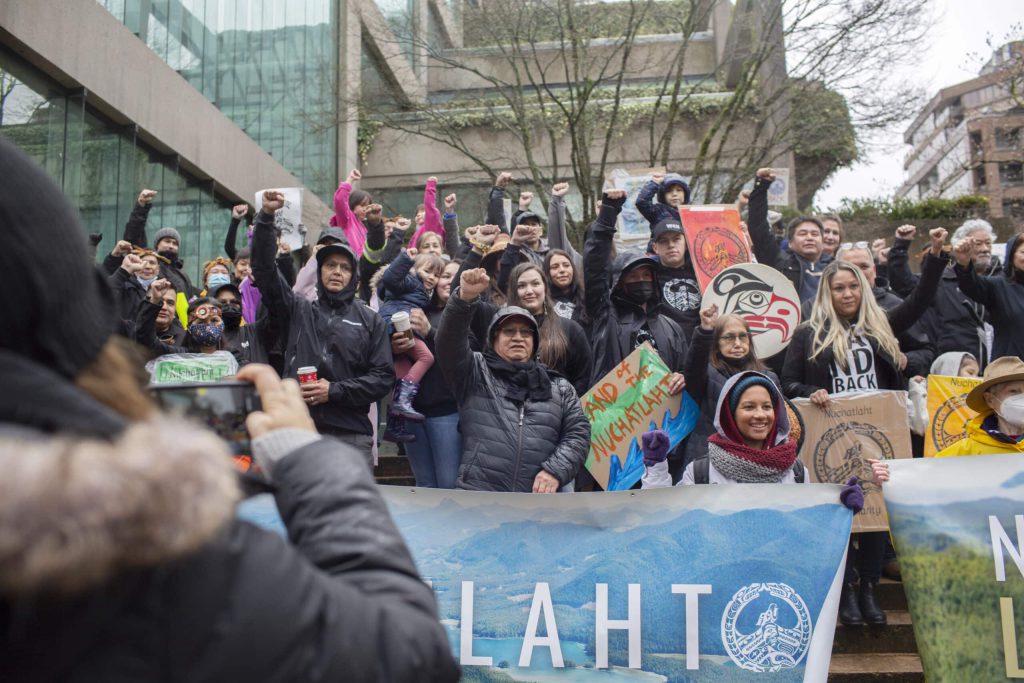
Author
Latest Stories
-
‘Bring her home’: How Buffalo Woman was identified as Ashlee Shingoose
The Anishininew mother as been missing since 2022 — now, her family is one step closer to bringing her home as the Province of Manitoba vows to search for her
-
Amid climate impacts, leading Secwépemc firekeeper shares ‘a better way of looking after the land’
In a time of worsening wildfires, Joe Gilchrist says cultural burning ‘needs to be multiplied hundreds of times’ — returning to Indigenous stewardship




